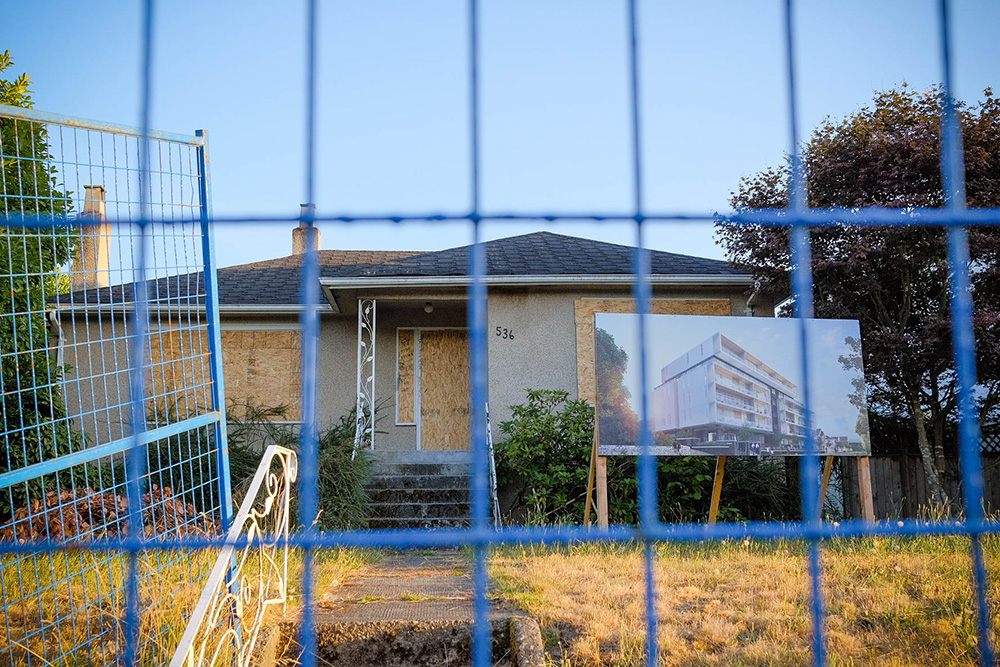The City of Vancouver, in the context of its “Housing Reset” initiative, has set a goal of 20 per cent affordable housing for new construction. This is a laudable goal, but it makes you wonder about the other 80 per cent. Is our collective ambition to have a city where only one out of five of us can afford to live? And who are those other 80 per cent anyway?
Let’s take a step back in history. In both Canada and the United States the “20 per cent affordable” target has come out of a somewhat wonkish process. First you assume that the market can supply housing to 80 per cent of the employed and able bodied. That leaves 20 per cent that the market can’t reach and thus need a helping hand from the state.
That strategy has worked OK in most metropolitan areas. In most metro areas in the U.S. and Canada there was a firm relationship between the average family income in the region and the average cost of housing.
But we all know that here in Vancouver that is no longer true. Our average cost of housing is about three to four times higher than it should be if you use average family income as your measuring stick.
So while a housing strategy that targets 20 per cent affordable housing might make sense in Tulsa, Oklahoma, it is clearly not calibrated to the enormity of the task at hand here in Vancouver, where the majority of working residents need affordable housing, not just 20 per cent.
This begs the question: what can we do instead? A possible answer: tax land to house the middle class.
This might take a bit of explaining so bear with me. What we have in Vancouver is a classic case of speculative investment going into non-productive uses — that non-productive use is land which by itself doesn't produce anything. Now certainly that speculative value shows up on the provincial ledgers, especially in the form of transfer taxes and other taxes on real estate sales. But land doesn't produce anything. Factories make things, stores sell things, barista's foam things, farmers grow things, miners mine things. These activities combine capital (i.e. the money needed to purchase the store, the factory, the espresso machine, the mine, etc.) and labour (jobs) to produce new value. These are productive uses of capital. Productive combinations of capital and labour are the very engine of wealth creation, also known to some as capitalism. But “rent seeking” in the form of land speculation adds nothing to the capital value of society and does not, according to some very eminent figures, add wealth — it consumes it.
Even Adam Smith himself, known mostly for his faith in the “invisible hand” of free markets, derided the passivity of land owners who produce nothing when compared to the farmer, craftsman, or factory owner: “As soon as the land of any country has all become private property, the landlords, like all other men, love to reap where they never sowed, and demand a rent even for its natural produce.”
With this lens we might now separate the productive and non-productive elements of our local economy, and conclude that we don’t really have a housing problem, we have a land speculation problem. I and others have many times delved into where all this money is coming from and what impact it has on our local wage earners (all bad), so no need for more of that here. What we all want to know is what to do about it.
Vancouver's own Matt Hern points to a potential solution in his new book What a City Is For.
He is among those who would revive the proposals of Henry George who was an economics phenomenon at the turn of the 20th century. His proposal was simple. Tax only land: do not tax other property or incomes. In this way, the burden of maintaining society falls most heavily on those who passively benefit from the work of others. Land speculation yields an unearned “wind fall” profit which can and should be heavily taxed. In our city, all of the value in the land is the consequence of generations of public efforts. Roads, parks, SkyTrain systems, airports, hospitals, all of it, gives our land value. And yet the benefit of this public effort accrues passively to a few private land owners, and increasingly to speculators, who, as Adam Smith lamented, "reap what they never sow."
It may now be of value to take a similar approach, i.e. to tax land more heavily, using the proceeds to insure that decent housing exists for everyone who works in this city. Not just 20 per cent of us, but everyone. And not by depending entirely on the marketplace to supply 20 per cent “affordable market rate” housing in most new projects as the city currently proposes. Affordable market rate housing (beyond being an oxymoron) translates into very tiny apartments, generally unsuitable for the domestic needs of the families Vancouver needs to retain.
Certainly those at the top end of the income scale can be housed by the market, as can those who increasingly resort to the "bank of mom and dad" for their six-figure down payments. But what of the rest? Under these circumstances more than half of those who presently work in the city (or, importantly, those we would like to attract here to support other aspects of our local economy besides real estate) would not be accommodated. And 20 per cent of our families living in “affordable” micro suites just won’t do it.
A more appropriate and achievable goal might be to supply housing for closer to 50 per cent of our wage earners, housing that would be protected from the market and not be its victim. This would mean an additional 35 per cent truly affordable and right-sized housing, on top of the roughly 15 per cent of this city’s housing that is already supported in one way or another. Funding for some of this may be partly in the pipeline, with provincial commitments to supply thousands of units; but that won’t be enough. Perhaps under our present circumstances it’s time to look further afield for models, like Vienna where over 60 per cent of housing is held outside of markets, or Singapore where the number is over 80 per cent. In these attractive cities, wage earners are guaranteed an affordable home and housing stress on the middle class is virtually eliminated.
And where would this additional money come from? Not from income tax or tax on productive businesses, but, as Henry George would recommend, on our land. We have unwittingly unleashed a speculative frenzy through our policies, a frenzy that is enriching only those speculators who enjoy the natural monopoly created by the limited supply of land. They invest but do not have to worry about risk or competition and this is not a proper fair or logical “market.” The City of Vancouver currently tries to capture up to 80 per cent of the “land lift” (value increase) created by rezonings in the form of charging a Community Amenity Contribution tax on development. But increasingly we lose out as the speculators move in well before the rezoning application process begins, allowing them to claim that the market can’t support a high CAC tax given how much the land cost them. This is going on right now all along Cambie Street where the city’s green light to development has unleashed a speculative torrent of value created by public investment in rapid transit.
A more even citywide land tax in the form of a higher citywide or district-wide Development Cost Levy would reduce the rage of speculation that focuses on one or two new designated development areas of the city, while generating the hundreds of millions necessary for the city to become the Vienna of Canada. A key benefit of this model, as proven in Vienna, is that it reduces the speculative value of development land without increasing the market cost of units, while allowing the city to purchase land for housing at a lowered cost (due to the way that the tax on land mitigates speculative increases in the cost of development land throughout the city).
It seems time to admit that depending on the market itself to solve our housing problem will never work. The market is broken and requires intervention. One need only look at the failing Cambie corridor experiment, where a single house lot is on the market for the outrageous price of $11 million dollars, doubling in price in only 18 months. We are enduring a tsunami of international capital which is being used to create speculative real estate values that are robbing us of the community we have collectively created. This uncontrolled, illogical and immoral speculative wave is forcing our sons and daughters to other lands to survive. A tax on land speculation, tried with success in other nations, is worth considering. No amount of rearranging deck chairs on the Titanic will do. Vancouver real estate is a rigged game of monopoly with a few winners and a vast public body whose lives are severely diminished. A city that is unaffordable to 80 per cent is not a goal worth reaching, nor is it a city worth living in. ![]()
Read more: Housing, Municipal Politics
















Tyee Commenting Guidelines
Comments that violate guidelines risk being deleted, and violations may result in a temporary or permanent user ban. Maintain the spirit of good conversation to stay in the discussion.
*Please note The Tyee is not a forum for spreading misinformation about COVID-19, denying its existence or minimizing its risk to public health.
Do:
Do not: